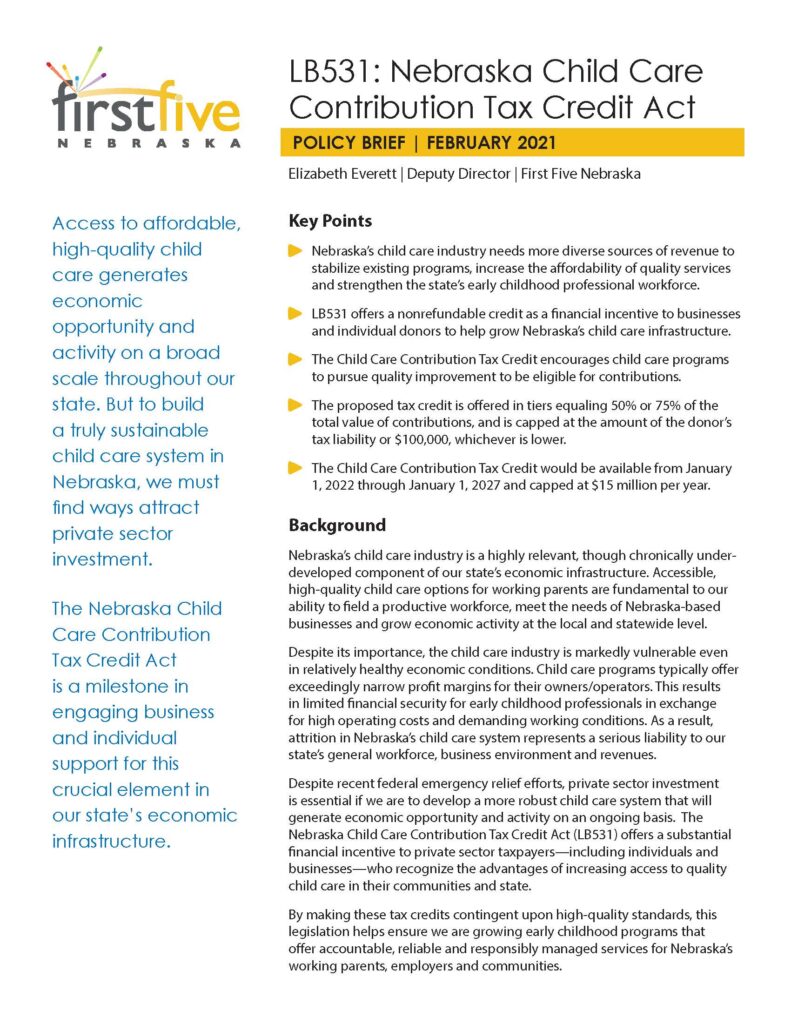The Legislature’s Revenue Committee heard testimony this week on LB531: Adopt the Nebraska Child Care Tax Credit Act. Introduced by Senator Tom Briese, District 41, the legislation would offer financial incentives to taxpayers—including businesses and individuals—to bolster early childhood infrastructure through targeted contributions.
Even during stable economic periods, the child care sector operates on extremely narrow margins. For business owners, there is little financial security, and for the early childhood workforce, even less. Child care workers earn on average about $11.12 per hour1 and often do not have access to benefits.
The COVID-19 pandemic has further exacerbated gaps in Nebraska’s child care infrastructure, forcing many businesses to close their doors, at least temporarily. Under state and local health measures, early childhood programs have been required to adhere to health and safety requirements that have increased operational costs and reduced incomes.
Even though the federal government has stepped up with COVID-19 relief funding in response to the public health emergency, the long-term stability of the child care system remains vulnerable if additional investments are not made. It is imperative to find alternative sources of revenue to stabilize and expand child care programs statewide. That is the goal of LB531: it offers tax credits to encourage businesses and individuals to contribute directly to quality early childhood programs.
On introducing the legislation, Senator Briese said: “LB531 is about building on our strengths as a state. Nebraska has a proven track record for involving both its public and private sectors to address some of our most pressing early childhood challenges. This bill creates rewarding opportunities for taxpaying individuals, businesses and others to invest in a system that truly matters to our economic security and quality of life.”
The Nebraska Child Care Contribution Tax Credit offers a nonrefundable tax credit to any taxpayer that makes a qualifying monetary contribution to an eligible early childhood program. The credit may be claimed by businesses, resident and non-resident individuals, estates and trusts.
The tax credit is based on a tiered system and is equal to either 50% or 75% of the total contribution value. It is capped at the taxpayer’s actual income tax liability or $100,000, whichever is lower. If signed into law, the tax credit would be available for tax years 2022 through 2027, with the total amount capped at $15 million annually.
What contributions qualify?
The tax credit would apply to contributions that are made directly to an eligible child care program or intermediary organizations that enhance quality child care for children ages birth to 12. Contributions must be made as cash, cash equivalents, agricultural commodities, livestock or publicly traded securities. However, contributions of services or property are excluded.
Qualifying contributions may be used to establish or operate high-quality programs, train the early childhood workforce or provide scholarships to help working parents pay for child care.
Which providers are eligible?
Child care programs that would be eligible to receive a contribution include licensed Family Child Care Homes (I and II), Child Care Centers, Preschool or School-Age-Only Centers that participate in Step Up to Quality, Nebraska’s quality rating and improvement system. The programs may be for- or non-profit.
Contributions to for-profit businesses, including family home providers, qualify if they are used for acquiring and improving facilities, equipment or services.
Encouraging investment in Opportunity Zones
The legislation prioritizes an increased credit amount for contributions to early childhood programs that operate in federally designated Nebraska Opportunity Zones. The federal Opportunity Zone Program was established by Congress through the Tax Cuts and Jobs Act of 2017 to promote investment and drive economic growth in low-income and/or economically disadvantaged communities. There are 44 Opportunity Zones in 18 Nebraska counties: Adams, Buffalo, Colfax, Dakota, Dawson, Dodge, Douglas, Garfield, Hall, Lancaster, Lincoln, Madison, Merrick, Red Willow, Scotts Bluff, Thurston, Valley and York.
The case for private investment in child care
LB531: the Nebraska Child Care Contribution Tax Credit Act offers substantial financial incentives to taxpayers who recognize the advantages of increasing access to quality child care statewide. This bill opens the door to empower businesses and individuals to invest in early childhood education and the children, families and workforce who benefit from those investments in their communities.
Learn more by reading our LB531 policy brief and legislative testimony.
1 U.S. Bureau of Labor Statistics, Standard Occupational Classification code for child care workers, May 2019. http://www.bls.gov/soc/home.htm




